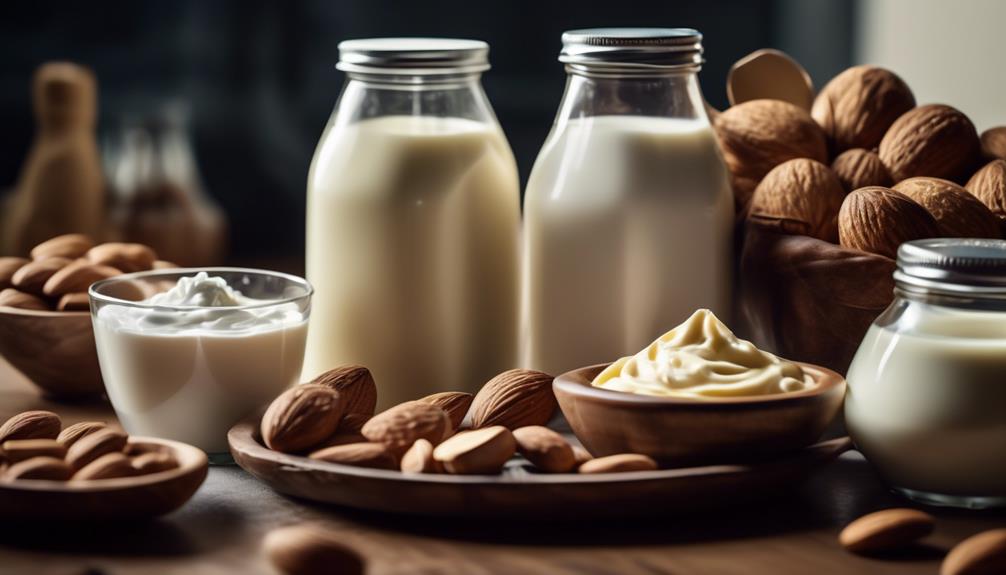Are you tired of feeling like a fish out of water when it comes to finding suitable dairy substitutes for your keto lifestyle? Well, fear not, because we've got you covered!
In this discussion, we will dive into the world of top keto-friendly dairy substitutes for those with lactose intolerance. From creamy almond milk to indulgent dairy-free cheese, we will explore a range of options that will make your taste buds dance with joy.
So, grab a seat and get ready to embark on a journey of tantalizing flavors and nutritious alternatives that will leave you wanting more.
Almond Milk
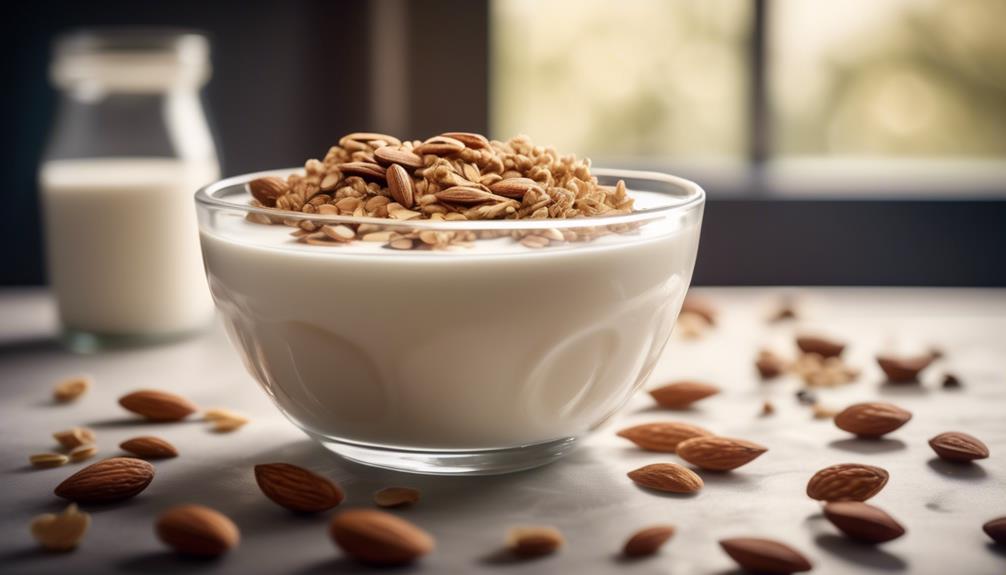
If you're looking for a keto-friendly dairy substitute, almond milk is a versatile option that can be easily incorporated into your diet. Not only is almond milk low in carbs and high in healthy fats, but it also provides a creamy texture and a slightly nutty flavor that can enhance a variety of dishes.
When it comes to almond milk alternatives, there are several options available in the market. You can choose from unsweetened almond milk, vanilla almond milk, or even chocolate almond milk, depending on your personal preferences and dietary needs. Just make sure to opt for unsweetened varieties to keep your carb intake in check.
Almond milk can be used in a multitude of recipes, making it a convenient dairy substitute for those following a keto diet. You can use it as a base for smoothies, pour it over keto-friendly cereals, or use it as a substitute for regular milk in baking recipes. It can even be added to soups, sauces, and curries to enhance their creaminess without adding excessive carbs.
Coconut Milk
Coconut milk is a keto-friendly dairy substitute that offers various nutritional benefits. It's rich in healthy fats, vitamins, and minerals, making it a good source of energy and supporting overall health.
Additionally, coconut milk can be used in cooking and baking, adding a creamy and tropical flavor to your dishes while keeping them low in carbohydrates.
Nutritional Benefits of Coconut Milk
One of the key reasons why incorporating coconut milk into your diet can be beneficial is due to its impressive nutritional profile. Coconut milk is rich in essential nutrients that can support your overall health and well-being.
Here are some of the health benefits of coconut milk:
- High in healthy fats: Coconut milk is a great source of medium-chain triglycerides (MCTs), which are easily digested and can provide a quick source of energy.
- Supports heart health: The healthy fats in coconut milk can help improve cholesterol levels and reduce the risk of heart disease.
- Boosts immune system: Coconut milk contains lauric acid, which has antimicrobial and antiviral properties that can help strengthen your immune system.
- Aids in digestion: The fiber content in coconut milk can support a healthy digestive system and prevent constipation.
- Promotes weight loss: The MCTs in coconut milk can increase feelings of fullness and boost metabolism, making it a great addition to a weight loss diet.
Incorporating coconut milk into your diet can't only add a delicious flavor to your meals, but also provide you with a range of health benefits. Try using coconut milk in various coconut milk recipes to enjoy its nutritional advantages.
Cooking and Baking With Coconut Milk
When incorporating coconut milk into your cooking and baking, you can explore a wide range of delicious and nutritious recipes. Coconut milk isn't only a great dairy substitute for those with lactose intolerance, but it also offers several benefits when used in cooking and baking.
One of the main advantages of using coconut milk is its high fat content, which adds a rich and creamy texture to dishes. Additionally, coconut milk is a great source of medium-chain triglycerides (MCTs), which are known for their potential to boost metabolism and aid in weight loss.
Coconut milk can be used in both savory and sweet recipes, such as curries, soups, smoothies, and desserts. Its unique flavor and versatility make it a fantastic ingredient to experiment with in the kitchen.
Cashew Milk
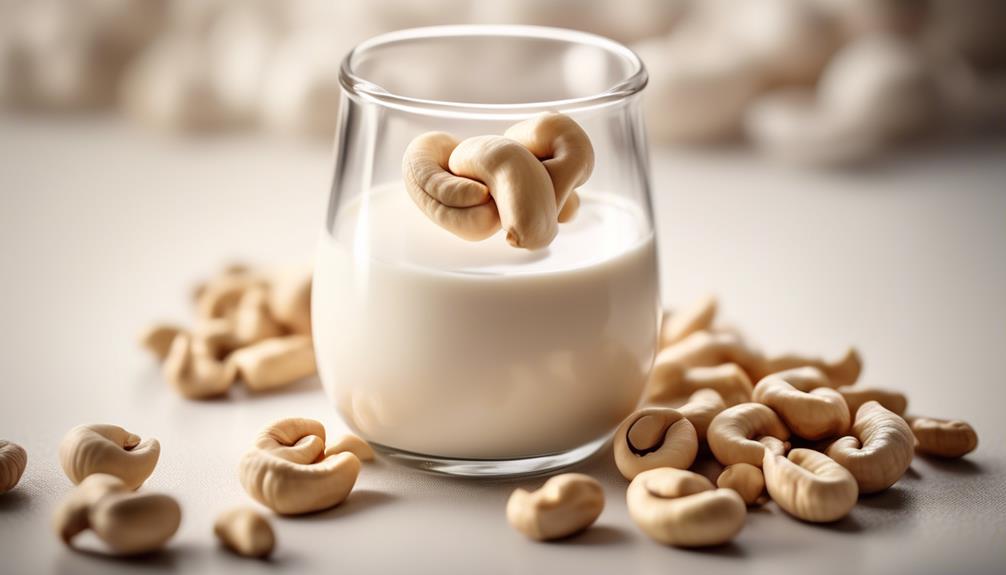
To incorporate a dairy substitute into your keto-friendly diet, consider cashew milk as an excellent option. Made from blending cashews with water, it isn't only creamy and delicious but also comes with a range of benefits.
Here are some reasons why cashew milk should be on your radar:
- Nutrient-rich: Cashew milk is packed with essential nutrients such as healthy fats, vitamins, and minerals. It contains heart-healthy monounsaturated fats that can help improve cholesterol levels.
- Lactose-free: If you're lactose intolerant, cashew milk is a fantastic alternative to dairy milk. It provides the creaminess without the digestive discomfort.
- Low in carbs: For those following a keto diet, cashew milk is a great choice as it's low in carbohydrates. It allows you to enjoy a creamy beverage while staying within your carb limits.
- Versatile: Cashew milk can be used in a variety of keto-friendly recipes, from smoothies and desserts to sauces and soups. Its creamy texture and mild flavor make it a versatile ingredient in the kitchen.
- Easy to make at home: While you can easily find cashew milk at the grocery store, making it at home is simple and cost-effective. All you need is cashews, water, and a blender.
Incorporating cashew milk into your keto-friendly diet not only provides a dairy-free alternative but also offers various health benefits. Whether you use it in recipes or enjoy it on its own, cashew milk is a delicious and nutritious addition to your keto lifestyle.
Hemp Milk
If you're looking for another dairy substitute to add to your keto-friendly diet, consider incorporating hemp milk into your routine. Hemp milk is a plant-based milk alternative made from hemp seeds. It's lactose-free and low in carbohydrates, making it a suitable choice for those following a keto diet.
One of the key benefits of hemp milk is its nutritional profile. It's rich in omega-3 and omega-6 fatty acids, which are essential for brain health and reducing inflammation in the body. Hemp milk also contains all nine essential amino acids, making it a complete protein source. Additionally, it's a good source of vitamins and minerals such as calcium, vitamin D, and magnesium.
Incorporating hemp milk into your keto recipes is easy. You can use it as a base for smoothies, desserts, or even in your morning coffee. It can also be used as a substitute for regular milk in baking recipes.
To make hemp milk at home, simply blend hemp seeds with water and strain the mixture. You can also add sweeteners like vanilla extract or dates for flavor. Experiment with different recipes to find the taste that suits you best.
Oat Milk
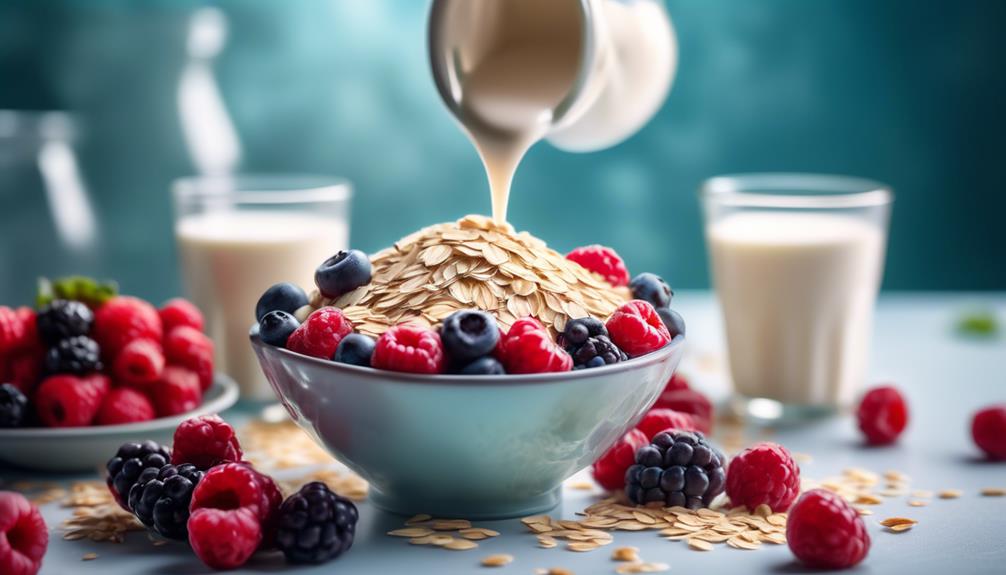
Oat milk is a popular dairy substitute that can be easily incorporated into a keto-friendly diet. It's a creamy plant-based milk made from oats and water, making it suitable for lactose intolerant individuals. If you're looking for oat milk alternatives, you'll be pleased to know that there are various brands available in stores or you can even make it at home.
Here are five benefits of oat milk for your skin:
- Hydration: Oat milk is rich in moisture, making it an excellent hydrating agent for dry skin. It helps replenish moisture levels and keeps your skin soft and supple.
- Soothing properties: Oat milk contains anti-inflammatory compounds that can soothe irritated skin. It can be beneficial for conditions like eczema and dermatitis.
- Gentle cleansing: Oat milk has natural cleansing properties that can effectively remove dirt, oil, and impurities from your skin without stripping it of its natural oils.
- Antioxidant boost: Oat milk is a good source of antioxidants, such as vitamin E. Antioxidants help protect your skin from free radicals, which can contribute to premature aging.
- Nourishment: Oat milk is packed with vitamins and minerals that nourish your skin, leaving it healthy and radiant.
Incorporating oat milk into your skincare routine can provide numerous benefits for your skin, making it a great alternative to dairy-based products.
Soy Milk
Soy milk is a popular dairy substitute for those following a keto diet due to its nutritional benefits. It's rich in protein, low in carbohydrates, and contains essential amino acids.
In addition, soy milk can be used in cooking and baking as a substitute for regular milk, making it a versatile option for keto-friendly recipes.
Nutritional Benefits of Soy
With its impressive array of nutrients and potential health benefits, soy milk stands out as a versatile and nutritious alternative to traditional dairy products. Here are some of the nutritional benefits of soy:
- Rich in protein: Soy milk is a great source of plant-based protein, which is essential for muscle growth and repair.
- Low in saturated fat: Unlike dairy milk, soy milk is low in saturated fat, making it a heart-healthy choice.
- Contains essential amino acids: Soy milk provides all the essential amino acids that our bodies need for optimal functioning.
- High in vitamins and minerals: Soy milk is often fortified with vitamins and minerals like calcium, vitamin D, and B vitamins, which are important for bone health and overall well-being.
- Good for digestion: Soy milk contains dietary fiber, which can help promote healthy digestion and prevent constipation.
Incorporating soy milk into your diet can be as simple as using it in your morning coffee, smoothies, or in various soy-based recipes. Enjoy the nutritional benefits of soy while exploring new flavors and dishes.
Cooking and Baking With Soy
To enhance your cooking and baking repertoire, incorporating soy milk as a versatile and nutritious dairy substitute opens up a world of possibilities.
In addition to being lactose-free, soy milk is rich in protein and contains essential nutrients such as calcium, vitamin D, and potassium.
When using soy milk in cooking and baking, it's important to note that it has a slightly different flavor compared to cow's milk. However, its creamy texture makes it an excellent choice for making sauces, soups, and desserts.
Soy milk can also be used as a substitute for cow's milk in recipes for pancakes, muffins, and bread.
Additionally, tofu, which is made from soy milk, can be a great alternative to meat in various dishes, offering a good source of plant-based protein.
Incorporating soy milk and tofu into your cooking and baking not only caters to lactose intolerance but also provides numerous health benefits associated with soy consumption.
Goat Milk

Goat milk offers a keto-friendly alternative to traditional dairy products, providing a nutritious and flavorful option for those following a ketogenic diet. Here are some reasons why you should consider incorporating goat milk into your diet:
- Rich in essential nutrients: Goat milk is packed with essential nutrients like calcium, potassium, phosphorus, and vitamins A and B. These nutrients are crucial for maintaining strong bones, a healthy immune system, and optimal brain function.
- Easier to digest: Many people who are lactose intolerant find that they can tolerate goat milk better than cow's milk. This is because goat milk contains lower levels of lactose and has smaller fat globules, making it easier to digest.
- Goat cheese alternatives: Goat milk can be used to make a variety of delicious and keto-friendly cheese alternatives. Goat cheese, feta, and chevre are great options that add a tangy and creamy flavor to your meals.
- Rich in medium-chain triglycerides (MCTs): Goat milk contains a high amount of MCTs, which are easily converted into energy by the body. MCTs are known to promote weight loss, boost metabolism, and enhance cognitive function.
- Supports healthy skin: Goat milk contains a natural alpha-hydroxy acid called lactic acid, which helps to gently exfoliate the skin. It also contains vitamins and minerals that nourish and hydrate the skin, making it a great ingredient for skincare products.
Incorporating goat milk into your keto diet can provide you with a range of health benefits while adding a delicious twist to your meals. Give it a try and experience the unique flavors and nutrients that goat milk has to offer.
Sheep Milk
If you're looking for another keto-friendly dairy substitute, consider incorporating sheep milk into your diet for its unique nutritional profile and potential health benefits. Sheep milk is a great alternative for individuals who are lactose intolerant or sensitive to cow's milk. It contains lower levels of lactose than cow's milk, making it easier to digest for those with lactose intolerance.
Additionally, sheep milk is rich in vitamins and minerals such as calcium, phosphorus, and vitamin B12, which are essential for maintaining strong bones and teeth, as well as supporting nerve function and red blood cell production.
One of the key benefits of sheep milk is its high fat content, which makes it an excellent choice for individuals following a ketogenic diet. The healthy fats found in sheep milk can help promote satiety, support brain health, and provide a steady source of energy. Sheep milk also contains a unique protein profile, with higher levels of casein and whey proteins compared to cow's milk. These proteins are important for muscle growth and repair.
In terms of taste, sheep milk has a rich and creamy flavor that many people find enjoyable. It can be used as a substitute for cow's milk in various recipes, such as smoothies, desserts, and sauces. If you're unable to find sheep milk in your local grocery store, you can also explore sheep milk alternatives such as sheep milk cheese and yogurt. These alternatives can provide similar nutritional benefits and add a delicious twist to your keto-friendly meals.
Nutritional Yeast

Nutritional yeast is a versatile ingredient that can be a valuable addition to your keto-friendly diet. Not only does it provide a cheesy, nutty flavor to your dishes, but it also offers several nutritional benefits. Here are some benefits of incorporating nutritional yeast into your diet:
- Rich in B vitamins: Nutritional yeast is a great source of B vitamins, including thiamine, riboflavin, niacin, and vitamin B12. These vitamins play a crucial role in energy production, metabolism, and brain health.
- Complete protein source: Nutritional yeast is a complete protein, meaning it contains all the essential amino acids your body needs. This makes it an excellent option for vegetarians and vegans looking to meet their protein requirements.
- Boosts immune function: Nutritional yeast contains beta-glucan, a type of fiber that has been shown to enhance immune function and promote a healthy gut.
- Supports a healthy nervous system: The B vitamins found in nutritional yeast are essential for maintaining a healthy nervous system and supporting cognitive function.
- Versatile ingredient: Nutritional yeast can be used in a variety of recipes, including soups, sauces, dips, and even as a topping for popcorn or roasted vegetables. Its cheesy flavor can help satisfy cravings for traditional dairy products.
Incorporating nutritional yeast into your keto-friendly diet can provide numerous benefits, from boosting your nutrient intake to adding a delicious twist to your meals. Experiment with different recipes and enjoy the versatility of this dairy substitute.
Dairy-Free Cheese
Looking for dairy-free cheese options on a keto diet? Nut-based alternatives can be a great choice, as they provide a creamy texture and a cheesy flavor. Almonds, cashews, and macadamia nuts are commonly used to create dairy-free cheeses that are low in carbs and high in healthy fats.
Additionally, plant-based cheese options made from ingredients like coconut oil and tapioca starch are also available, offering a tasty alternative for those following a keto lifestyle.
Nut-Based Alternatives
When it comes to finding dairy-free cheese alternatives, nut-based options offer a flavorful and versatile option for those following a keto-friendly diet. Nut-based alternatives aren't only delicious but also provide a creamy texture that can be easily melted and used in various dishes. Here are five nut-based alternatives that can be enjoyed by individuals with lactose intolerance:
- Cashew Cheese: Made from blended cashews, this dairy-free cheese alternative is rich and creamy, making it perfect for spreading or melting.
- Almond Cheese: Almonds can be used to create a smooth and creamy cheese alternative that can be enjoyed on its own or in your favorite recipes.
- Macadamia Nut Cheese: Macadamia nuts lend a buttery flavor to this dairy-free cheese substitute, making it an excellent choice for those seeking a luxurious taste.
- Brazil Nut Cheese: Brazil nuts have a unique flavor that adds depth to dairy-free cheese. They can be blended with other ingredients to create a delicious and nutritious alternative.
- Pistachio Cheese: Pistachios offer a slightly sweet and savory taste to dairy-free cheese. This nut-based alternative is perfect for adding a burst of flavor to your dishes.
Plant-Based Cheese Options
Plant-based cheese options provide a delicious and dairy-free alternative for individuals following a keto-friendly diet. If you're looking to replace traditional dairy cheese with a plant-based alternative, there are several options to choose from.
One popular option is plant-based butter, which can be used in cooking and baking, and provides a similar taste and texture to traditional butter.
Another option is lactose-free ice cream, which is made from plant-based ingredients like almond milk, coconut milk, or cashew milk. These ice creams aren't only dairy-free but also low in carbohydrates, making them a great choice for those on a keto diet.
When it comes to plant-based cheese, there are a variety of brands that offer alternatives made from ingredients like nuts, soy, or tapioca starch. These cheeses can be used in recipes that call for traditional cheese, such as pizzas, quesadillas, or pasta dishes.
Dairy-Free Yogurt
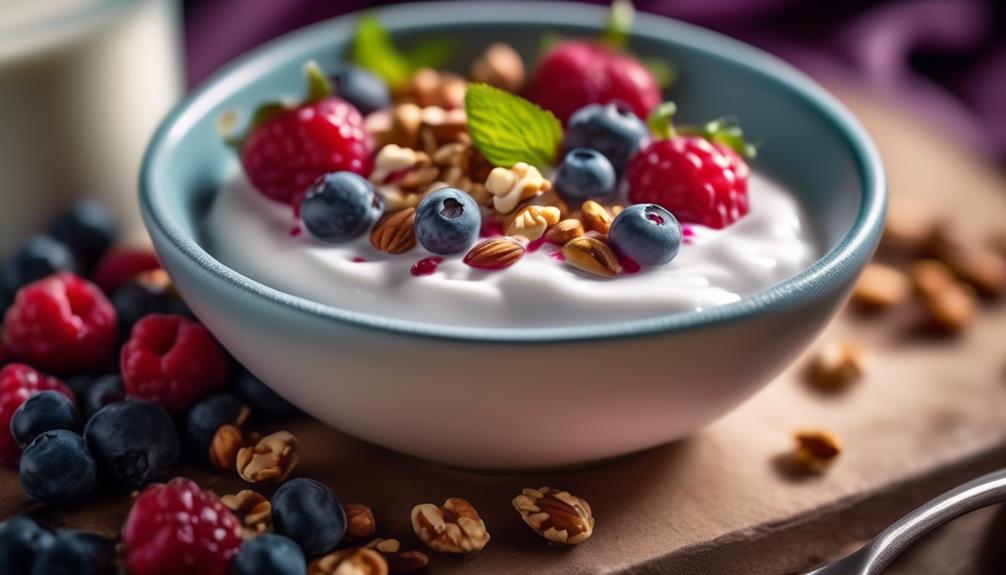
To enjoy a dairy-free alternative to traditional yogurt, consider trying one of these keto-friendly options:
- Coconut Yogurt: Made from the flesh of coconuts, this creamy yogurt alternative isn't only delicious but also packed with healthy fats and nutrients. It's a great source of medium-chain triglycerides (MCTs), which are known to boost energy and aid in weight loss. Coconut yogurt is also rich in antioxidants and can help improve digestion.
- Almond Yogurt: Made from almond milk, this dairy-free yogurt is a great option for those with lactose intolerance. It's low in carbs and high in healthy fats, making it a perfect choice for a keto diet. Almond yogurt is also a good source of vitamin E, magnesium, and calcium.
- Cashew Yogurt: Made from cashew milk, this dairy-free yogurt alternative has a smooth and creamy texture. It's rich in healthy fats, protein, and essential minerals like copper and zinc. Cashew yogurt is also a good source of antioxidants and can help support a healthy immune system.
- Soy Yogurt: Made from soy milk, this dairy-free yogurt is a popular choice for those following a vegan or vegetarian diet. It's high in protein and low in carbs, making it a suitable option for a keto diet. Soy yogurt is also a good source of calcium and vitamin D.
- Oat Yogurt: Made from oat milk, this dairy-free yogurt is a great option for those looking for a creamy and nutritious alternative. It's high in fiber and contains beta-glucan, a type of soluble fiber that has been shown to lower cholesterol levels. Oat yogurt is also a good source of vitamins and minerals, including vitamin B12 and iron.
These keto-friendly dairy-free yogurt alternatives aren't only delicious but also nutritious. They can be enjoyed on their own or used in recipes as a substitute for traditional yogurt.
Conclusion
Overall, there are plenty of keto-friendly dairy substitutes available for those with lactose intolerance. From almond milk to dairy-free cheese, these alternatives provide a practical and evidence-based solution for individuals following a ketogenic diet.
So, whether you're looking for a milk alternative or a dairy-free yogurt option, you can easily find suitable options that align with your dietary needs. Embrace these substitutes and enjoy a lactose-free, keto-friendly lifestyle.

